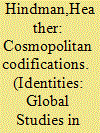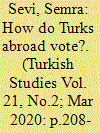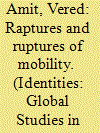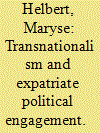| Srl | Item |
| 1 |
ID:
089202


|
|
|
|
|
| Publication |
2009.
|
| Summary/Abstract |
Globalization has been the site of many renegotiations of identity, both at the supra- and subnational levels. Yet, there is an interstitial zone of communication between the global and the local in which distinct processes of boundary-making and translation take place. This essay examines mediators of internationalization, elite nationals and expatriate employees, as they negotiate the form that difference can take in the global marketplace. The contentious politics of Nepalese nationalism as well as South Asian colonial delineations of difference provide precedents for the current social practices of a cosmopolitan population that establishes a hierarchy of difference while also excusing themselves from demarcation and restricting the purview of the concept of culture. The result is a zone made safe for the operation of neoliberal business (a practice seen to be without history or geography) with alterity only allowed in narrowly commodifiable settings.
|
|
|
|
|
|
|
|
|
|
|
|
|
|
|
|
| 2 |
ID:
171943


|
|
|
|
|
| Summary/Abstract |
Voting rights are an essential feature of democratic citizenship. Turkey enfranchised its expatriate citizens in 1995, but they were first granted the right to vote from overseas in the 2014 presidential election. We examine turnout and vote choice among expatriates in Turkish elections from 2014 to 2018. We find that turnout among expatriates is low and that they tend to vote in the same direction as domestic voters. Furthermore, the Justice and Development Party (AKP) and the People’s Democratic Party (HDP) tend to do better among expatriates compared to their domestic counterparts. Our analyses also suggest that expatriate voting is linked to the strength of voters’ ties to their country of origin. Moreover, expatriate vote choice appears to vary with geographic and political variables associated with the host countries.
|
|
|
|
|
|
|
|
|
|
|
|
|
|
|
|
| 3 |
ID:
143647


|
|
|
|
|
| Summary/Abstract |
In traditional migration theory, social self-identification is usually linked with the process and quality of integration and with the nationality of the countries of ‘origin’ and of residence. But in the context of a supranational integrated area like the European Union, the self-identification of European people living (also) abroad in another European country can be more complicated. What sorts of identity combinations do they produce in this situation? Could we interpret their choice in the light of their social, economic, cultural capitals and (multi)local integration? Based on an empirical analysis of French citizens in Berlin this article confirms that identity self-combining – not just the identity elements – and the position of the ego in the social space are related. The meaning of the same identity category depends on the respondent’s profiles.
|
|
|
|
|
|
|
|
|
|
|
|
|
|
|
|
| 4 |
ID:
116584


|
|
|
|
|
| Publication |
2012.
|
| Summary/Abstract |
This article examines the ways in which the trope of rupture has progressively figured in my studies of diverse forms of mobility. Ironically, this has occurred at the same time as an increasing orientation within migration studies towards transnational links has given a strong emphasis on continuity. I argue that this kind of methodological transnationalism does not give enough attention either to the disjunctures that are routinely involved in mobility or to the possibility that rupture might be an actively desired goal for moving either temporarily or for the longer term.
|
|
|
|
|
|
|
|
|
|
|
|
|
|
|
|
| 5 |
ID:
160462


|
|
|
|
|
| Summary/Abstract |
The aim of this article is to provide an appreciation and analysis of the expatriate connectivity of Italian and French citizens from their place of residence in Australia through their respective elections in their home countries. Specifically, the article examines the case of Italians in Australia voting in the 2013 Italian elections and equally that of French citizens in Australia voting in the French presidential and the following legislative elections in 2017. The article examines the voting patterns there might be between those voting in their home country (Italy and France) and those voting in external electoral colleges (in this case, the relevant Australian college). The article shows that those living abroad—in this case, Australia—provide different political choices and less surprising low voting participation compared to the domestic districts. It also highlights that the transnational community can be, and is, influenced by the political context of their host country, which will be different from that which occurs in their home country.
|
|
|
|
|
|
|
|
|
|
|
|
|
|
|
|